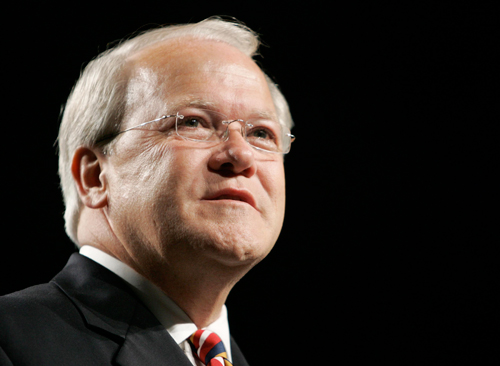INDIANAPOLIS–“Recognize the signs,” outgoing convention president Frank Page challenged convention messengers during his address to the annual meeting of the Southern Baptist Convention at the Indiana Convention Center in Indianapolis June 10.
Recounting how the natives of the island of Simuelue escaped one of the deadliest and most devastating disasters in history, the pastor of First Baptist Church, Taylors, attributed their vigilant responsiveness to recognizing the telltale signs. Despite having only minutes to prepare for the tsunami on December 26, 2004, which swept away hundreds of thousands of people in the Asian Pacific area, only seven of 78,000 inhabitants of the island died, he noted.
 Frank Page, pastor of First Baptist Church in Taylors, S.C. and president of the 16.4 million member denomination, delivers the presidents address on the first of the two-day Southern Baptist Convention annual meeting which this year convenes June 10-11 at the Indiana Convention Center in Indianapolis.
Frank Page, pastor of First Baptist Church in Taylors, S.C. and president of the 16.4 million member denomination, delivers the presidents address on the first of the two-day Southern Baptist Convention annual meeting which this year convenes June 10-11 at the Indiana Convention Center in Indianapolis.Sensing “something of unusual magnitude” was happening, village elders hurriedly conferred, wondering if what had occurred a century earlier, when the entire island was nearly destroyed, could be happening again, Page recounted. “Erring on the side of caution, they called for residents along the coast to head for high ground.”
As a result, the death toll was not nearly as severe as elsewhere. The villagers recognized the dangers signs and spread the alarm, saving countless lives that day, while thousands in places much farther away from the central point of the quake perished, he said.
“Will we, as Southern Baptists, recognize the signs of what is happening among us?” Page asked. “Will we assiduously impart to those after us the signs that God has set forth for blessing, and the signs the God has set forth for judgment?”
Basing his message on the story of the Samaritan woman at the well, Page observed that “something occurred in transforming her that needs to occur in transforming us.”
Like her, God wants Southern Baptists to “see ourselves as we really are” he asserted.
When confronted by Christ, this woman realized that “He was cognizant of her strengths and weakness. He could see the good and the bad. He knew it all,” Page noted.
When confronted by Christ, “we are compelled to deal with who we are, and to let go of all the false facades that sometimes we place before Him – all the pretenses, all the excuses, all of the outward appearances,” he said.
Decrying a tendency to evade the real issues and to rely on a “substitute righteousness,” Page said, “That’s the call of cultural Christianity: Keep things on the surface; keep things shallow. Do not deal with reality; do not deal with what is really going on in your family, in your church, in your life.”
Southern Baptists have a tendency to rely on similar avoidance mechanisms, blaming others for what is wrong in the convention or to fault the conservative resurgence with failing to bring forth a change in the baptismal rate. But “the truth is, individuals and churches are the ones who are in decline,” he said.
“We have been ignoring God’s call to repentance and failing to be relevant to a culture that sees us as representatives of death, not as representatives of life, Page charged.
“Blame the denomination if you wish, but the problem is me,” he said. “I have not been winning people to Christ as much as I ought.
“If anything comes out of this convention, would you join with me in saying, ‘The problem is not somebody else; the problem is me,'” Page urged.
But Christ not only has the ability to see into the depths of human heart, He also has the ability to transform lives, Page declared. “He is able to see past the hurt, the sin, and the failure and to see the person that we can become,” he said.
God’s desire is for Southern Baptists to prosper in the work of the Lord, Page affirmed.
“I believe that He can see past the hurt and the pain, and He can see a body of believers unified, despite our differences, to see the cause of world evangelization and missions occur in this generation,” he said. “I believe God looks past the hurt and the pain, and He sees a body of believers who can support the Cooperative Program and win lost for Christ at the same time. They are not mutually exclusive.”
Noting that her first instinct was to share the good news, Page said, “This woman, who had been the talk of the town, now encouraged the town to talk about Jesus. This woman, who had been a source of spiritual failure, now became a source of spiritual good news.”
Calling Southern Baptists to join him in being part of a “Great Commission resurgence,” Page urged them to “fall in love with Christ all over again.”
